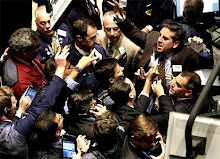NEW YORK (AP) — A quiet day on Wall Street turned into the worst sell-off in three months after a Federal Reserve official said he doubted the bank's effort to boost economic growth would work.
Charles Plosser, president of the Fed's Philadelphia branch, told an audience Tuesday that the Fed's effort to support the economy would likely fall short of its goals. And if the Fed looks ineffective, it could undermine future Fed action.
The speech probably startled some investors who had faith in the Fed's
latest plan, said Jack Ablin, chief investment officer Harris Private
Bank. The plan includes buying $40 billion in mortgage bonds each month
until the economy improves.
"So many investors have bought into the illusion," he said. "And it was like Plosser pulled up the curtain on the Wizard of Oz."
The
Standard & Poor's 500 index lost 15.30 points, its fourth straight
decline, to close at 1,441.59. The 1.05 percent drop was the worst for
the S&P since June 25.
The Dow Jones industrial average lost 101.37 points to close at 13,457.55. Caterpillar
tugged the Dow down, losing 4 percent. The world's largest maker of
bulldozers and other heavy equipment said late Monday that slower economic growth around the world dampened its earnings forecast. Its stock sank $3.86 to $87.01.
Stocks
enjoyed one of their biggest rallies of the year Sept. 6 after Mario
Draghi, the president of the European Central Bank, laid out a plan to
buy unlimited amounts of government bonds to lower borrowing costs for
Europe's debt-burdened countries.
A week later, Fed Chairman Ben Bernanke
announced the central bank's open-ended mortgage bond-buying program
and pledged to hold interest rates at super-low levels into 2015.
The
S&P set a four-year closing high of 1,465 the next day, Sept. 14,
but has drifted lower since and fallen back almost to where it was
before Bernanke's announcement.
On Tuesday, a batch of encouraging economic reports gave the stock market
a nudge in morning trading. House prices rose in major cities for a
third straight month, and a gauge of consumer confidence came in
surprisingly high.
More
surprising than those two economic reports was the Richmond Federal
Reserve's strong reading on regional manufacturing, a recent trouble
spot, said Phil Orlando, chief equity strategist at Federated Investors.
"Look at that. There were three data points on the economy and we crushed them," said Phil Orlando, chief equity strategist at Federated Investors.
But sagging profits could drag on the stock market
in the coming weeks, Orlando said. Caterpillar joined a growing
collection of companies have lowered their earnings forecasts. FedEx, a
bellwether of world trade, said that shipping has sunk to recession-like
levels. Railroad giant Norfolk Southern has also warned that falling
shipments and sinking coal prices will likely drag down its earnings.
Wall
Street analysts now estimate that corporate profits will sink this
quarter from a year earlier. That would be the first such drop in three
years.The Nasdaq composite index dropped 43.05 points to 3,117.73. Google's stock touched an all-time high in early trading, clearing $764, but closed the trading day at $749.16.
Apple, the largest public company in the world, lost $17.25, or 2.5 percent, to close at $673.54. It has lost more than $26 in two days. Apple is the biggest component in the S&P but is not included in the Dow, helping explain why the S&P suffered a greater percentage decline than the Dow's 0.8 percent.
The closely watched Standard & Poor's/Case Shiller index of national house prices increased 1.2 percent in July compared with the same month in 2011. Prices rose from the previous month in all 20 major cities tracked by the report for the third month in a row.
The Conference Board said its gauge of consumer confidence shot to a seven-month high in September, trumping forecasts by a large margin. People surveyed said they were more optimistic about the job market.
The Federal Reserve's
manufacturing index, which surveys companies in the central Atlantic
region, increased after shrinking for three months as businesses turned
more optimistic. Companies said they anticipate more orders and
shipments even as employment dips. The index turned positive in
September after a negative reading in August.
Treasury
prices rose as traders shifted money into safe assets. The 10-year
Treasury yield, the benchmark for mortgages and other loans, dipped to
1.67 percent, down from 1.71 percent late Monday.


